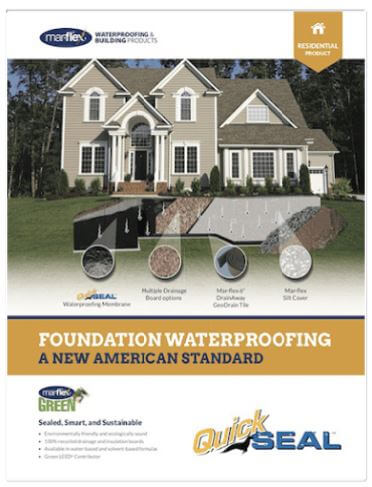Perhaps the most fulfilling part of working as an engineer, architect, builder, or contractor, is getting to create a new building. Knowing that your work contributed to creating a structure that will last a lifetime is very satisfying.
Doing everything in your power to make sure it lasts a lifetime or more is an essential part of the entire project.
This definitely includes protecting the foundation against water and water damage.
Trusted and experienced builders know that you can’t simply choose one method of waterproofing and expected to work. Nature is inventive. Nature finds ways. The prudent builder knows that the best offense is multiple defenses.
Here are some of the ways you can defend your foundation from water.
An external coat, sealant or membrane
Perhaps the most comprehensive approach to keeping water away from your foundation is similar to the approach you would take if you were going outside in the rain. You would put on a waterproof membrane, in this case a coat.
Well you can get a coat for your foundation too.
These waterproof barriers can wrap around your entire foundation and be sealed together to create a continuous waterproof wrap. Because they can be sealed together at the ends, these barriers can work much like a coat for your foundation.
In some treatment options, such as split-level foundations or construction on a hill, these can selectively be applied to the problematic side(s) of a building. This approach is less effective and is seldom recommended.
Water drainage and insulation
Even when a foundation is sealed against water, it is still smart to reduce the amount of water that ever makes it to the foundation. Responsible waterproofing companies deal with this by capturing water just below the surface and redirecting it to rainwater pipes downhill from the construction site.
These are often a combination of waterproof mats and water carrying pipes that team up to quickly funnel water away from the foundation.
The comprehensive approach additionally uses sloping away from the foundation so that surface water never even makes it to these other treatments.
Waterproof concrete
A more experimental approach is to try and make concrete that is waterproof. Though some companies claim to have perfected this approach, the naturally permeable nature of concrete, including its dependence on holes to keep it relatively light, means that concrete remains subject to the elemental force of water.
Water vapor can still penetrate and cause trouble when it condenses or – worse – freezes.
If you are looking for ways to protect your foundation from water, look to experienced home and industrial builders to provide a mix of solutions designed for your project.
